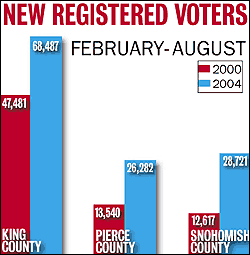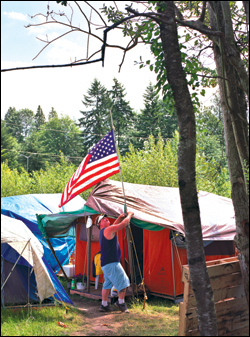If this year’s presidential election doesn’t boast a huge turnout, it won’t be for a lack of trying. Since 2000, dozens of new organizations have been working hard to educate the public and register new voters. Whether they are signing up voters at music concerts, talking to people at bus stops, or setting up voter-registration stations at local churches, these organizations are diverse in size, method, and target audience. They appear to be effective. King County has seen a 44 percent increase in new voter registrations in the past six months, compared to the same months of 2000. Pierce County saw a 94 percent increase in new registrations, and Snohomish County has seen an unprecedented 127 percent increase compared to 2000. Registrations don’t necessarily mean higher turnout, however, and experts and organizers have different opinions about how big the November electorate will be.
“We’re having huge outreach efforts and many requests for voter registration material,” says Hal Limus, project manager for the Washington secretary of state’s office.
The charged political atmosphere this year helps, of course. Political science professor John Wilkerson, of the University of Washington, says the differences between the major political parties are more pronounced than in past elections. Agrees communications professor John Gastil, also of UW: “It’s a more energized campaign year. . . . It’s hard to think of an election where more people thought more was at stake.”
The secretary of state’s office also attributes the increase to new methods of registering. The office’s downloadable Web registration form, at www.secstate.wa.gov/elections/register.aspx, has been very popular, particularly in reaching young first-time voters, Limus says.
Many organizations working to register voters also are finding they need to educate citizens about the political process. “People say, ‘Am I voting now?’ and we have to explain to people that they have to register first,” says Jenny Lawson, head organizer for Washington ACORN, an organization that has registered more than 23,000 people this year. Since 1970, ACORN has been an advocate for the poor, focusing on minorities and immigrants. This election season, Washington ACORN has been working more than in the past on registering new voters. “I think folks around the state see the opportunity this year and that their vote really counts,” Lawson says.
The Washington Citizen Action Network has also launched a registration drive bigger than any it has sponsored in its 20-year past. Principally a lobbying organization, advocating legislation to help the poor and minorities, the Washington Citizen Action Network has already registered half of its goal of 60,000 new voters. “We’re extraordinarily excited for the disenfranchised communities, to give them a voice like they haven’t had in the past,” says Shawn Cantrell, the organization’s executive director. The group approaches people at bus stops, street fairs, and parks, hoping that by reaching out in everyday settings, voting will seem like everyday business.
Unlike more established registration campaigns like Rock the Vote, which rely on celebrities and advertising to appeal to nonvoters, both Washington ACORN and the Washington Citizen Action Network focus on personal contact. “Face-to-face contact is the best way to motivate people to vote,” says Cantrell.
Gastil agrees that the personal approach is the most effective. “Based on the research I’ve seen, . . . the more personal and human the contact is, the more effectively the message is relayed,” Gastil says.
Most organizations focus on a particular demographic that will vote a certain way. Says Gastil, “The conventional wisdom for this election is that it’s not as much about persuading the undecided as motivating the decided.”
In an effort to mobilize the Christian right, Pastor Joseph Fuiten of Bothell’s Cedar Park Assembly has put registration displays in 2,300 churches, dispersing more than 30,000 forms. His goal is to register 60,000 new voters before the election.
“It has to do with motivation,” Fuiten says. “I think the motivation level is exceptionally high right now.” He cites gay marriage as a major motivating issue for the Christian community. The Washington Association of Churches is also encouraging registration and participation.
Some organizations are trying unconventional means. Code Pink, a women’s peace organization with an active chapter in Seattle, has been registering voters and selling pink T-shirts and other apparel to “give Bush the Pink Slip.” Music for America, a national organization focusing on Washington as a swing state, is hosting several concerts in Seattle to register voters who oppose Bush. On Music for America’s Web site, fans who are registered to vote are encouraged to start an “X Block”—to recruit friends to sign up in a Friendster-style voting block.
Driving Votes is a unique anti-Bush organization that began with a group of friends in Ballard discussing the election. Someone suggested they take a road trip and register voters in 11 swing states. They created a Web site, and now more than 1,000 people are planning road trips nationwide. “When people know we’re volunteers and we’ve driven from another state, they listen to us a little differently than paid political people,” says Nicki Bush, a founding member of Driving Votes.
Registrations might be up, and the secretary of state’s office is expecting higher numbers of votes than ever before, but not everyone is so sure we can expect a civic miracle. “It may make a difference in the election,” says Wilkerson, “but if past turnout has been 25–30 percent” among young people, for example, “it’s not likely this time we’ll have 75 percent turnout. That’s not going to happen.”
Gastil agrees, because there is still a great deal of apathy and disaffection out there. Chronic nonvoting is not a new phenomenon, he says, and will most likely continue to be a problem.





